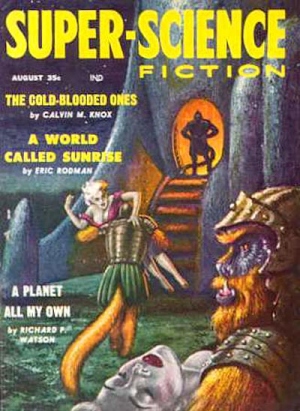Birthday Review: Alan E. Nourse’s “The Gift of Numbers”

Alan E. Nourse was born on August 11, 1928 and died on July 19, 1992. He also published stories using the names Al Edwards and Doctor X.
Alan E. Nourse received a Hugo nomination for Best Novelette for his story “Brightside Crossing” in 1956, the third year the Hugos were presented and the second time the Best Novelette Hugo was awarded. When Philip K. Dick’s novel Do Androids Dream of Electric Sheep was made into a film in 1982, the producers took the title of Nourse’s 1974 novel about underground medical services, The Bladerunner, for the Dick film. Nourse’s novel had been adapted for film in 1979 by William S. Burroughs, but the film was never made.
Nourse published “The Gift of Numbers” in Super-Science Fiction, edited by W.W. Scott in the August 1958 issue. The story was reprinted in Nourse’s 1971 collection Rx for Tomorrow and was also included in his German language collection Hospital Erde the following year. In 2012, Robert Silverberg selected the story for inclusion in the Haffner Press anthology Tales from Super-Science Fiction.
The Colonel is a low level con artist who scams ineffective bookkeeper Avery Mearns in a bar one evening. In exchange for $20 (about $170 in 2018 dollar values), the Colonel promises to trade his ability with numbers to Mearns and thereby save his job. Mearns takes the Colonel up on the offer and, naturally, that is the last he sees of the con man.
However, the Colonel is not quite the con artist that he appears and Mearns finds that he suddenly is quite effective when it comes to bookkeeping. Not only does he begin to save the company money, but he also realizes that he can skim from the company using bookkeeping tricks. While this would not have occurred to the mild-mannered Mearns who met the Colonel in the bar that evening, Mearns received some of the Colonel’s larceny along with his ability with numbers. Mearns used his abilities not only to steal from the company, but to steal other trinkets, completely unwittingly and unwillingly, until he is caught, at which time the company refused to press charges since he was bringing in more money than he was taking out. Mearns, however, began to look for the Colonel, who the police identified by several names and noted was on the lam.